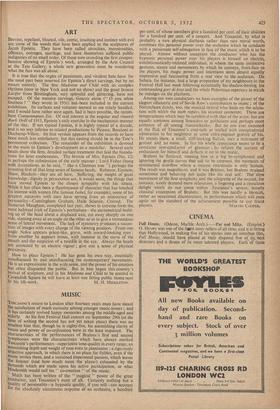MUSIC .
Toscitham's return to London after fourteen years must have meant the satisfaction of much curiosity among younger music-lovers ; and It has certainly revived happy memories among the middle-aged and elderly. At his first Festival Hall concert on September 29th (at the time of writing the second has not yet taken place) there was no smallest hint that, though he is eighty-five, his astonishing clarity of vision and power of co-ordination were in the least impaired. The characteristics of the performances of Brahms's first and second symphonies were the characteristics which have always marked Toscanini's performances—superlative tone-quality in every range, an astonishing depth and weight of tone even in pianissimo ; a rigorously objective approach, in which there is no place for foibles, even if the music invites them, and a sustained impersonal passion, which leaves the listener (and how much more the player) exhausted by the demands which are made upon his active participation, or what Hindemith would call his " co-creation " of the music.
Much has been• written of the " magical " power of the great Conductor, and Toscanini's most of all. Certainly nothing but a quality of personality—a hypnotic quality, if you will—can account for the absolutely unanimous response of an orchestra, a hundred
per cent. of whose members give a hundred per cent, of their abilities for a hundred per cent. of a concert. And Toscanini, by what is probably a rare physical diathesis rather than rare moral worth, combines this personal power over the orchestra which he conducts with a passionate self-abnegation in face of the music which is to be played. Almost without exception the conductor who has the hypnotic personal power over his players is himself an electric, exhibitionistically-inclined individual, in whom the same instinctive gestures, stance and movements by which he conveys, front-face to the players, his magic power. and intentions seem almost equally impressive and fascinating from a rear view to the audience. Do Sabata, for instance, had a large proportion of my neighbours in the Festival Hall last week following ecstatically his shadow-boxing, his commanding port de bras and the whole Polovtsian repertory in which he indulges on the platform. Among our own conductors we have examples of the power of the elegant silhouette and of Savile Row's contribution to music ; of the Nictzschean dandy, too, the musical milord who feeds on the adula- tion with which the mob repays his insolent contempt. These are temperaments which may be combined with that of the artist, but are equally common among financiers or politicians and perhaps most common of all among mountebanks. But no one ever swooned at the flick of Toscanini's coat-tails or smiled with conspiratorial admiration to his neighbour at some extra-piquant gesture of his. He stands there, a small, stiff-looking Italian, uses a minimum of gesture and no mime. In fact his whOle appearance seems to be a conscious non-conductor of glamour ; he refuses the current of enthusiasm for himself and deflects it on to the music.
Brahms he flattered, treating him as a big he-symphonist and ignoring the gentle curves that ask to be caressed, the moments of sentimental overflow where a minute ritardando is only human. The result was magnificent, and it was Brahms, but Brahms strained sometimes and behaving not quite like his real self. The slow movement of the first symphony and the allegretto of the second, for instance, surely demand more relaxation, a lingering and a conscious delight which do not come within Toscanini's severe, tensely classical conception of Brahms. But this was hardly a blemish, rather an occasional discoloration, in performances which will once again set the standard of the achievement possible to our finest players. MARTIN COOPER.


















































 Previous page
Previous page